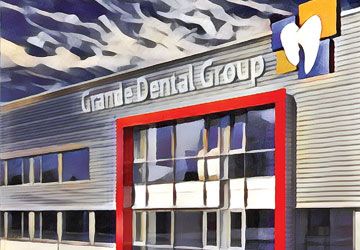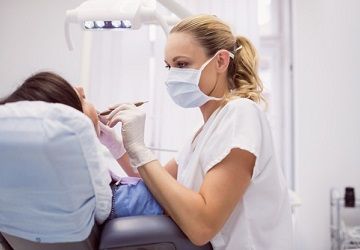Special Report: The Rise of Dental Service Organizations in America
Dental service organizations sometimes referred to as dental support organizations are becoming increasingly common in dentistry today. The American Dental Association estimates that 7.8 percent of dentists now belong to one, contracting with a DSO to handle the business side of operating a practice so that they can focus on the clinical side. DSOs advocates say they allow dentists to focus more on caring for patients. Critics, however, are concerned about corporate interests.

As dental service organizations become more popular, experts see the business of dentistry as they know it changing right before their eyes. Image source: Fotolia
Dentistry is, for better or for worse, a business. The business of dentistry is something an increasing number of practitioners have little time or patience for running, prompting the rise of dental service organizations, or DSOs.
According to the American Dental Association, 7.8 percent of dentists are part of a DSO, where a dentist handles the clinical side but another party owns the business and handles the accompanying responsibilities, such as payroll, ordering supplies, and staffing.
Dental professionals say they already see the change arriving in full force.
Maria G. Melone, CPA, CVA, is a partner at MORR Dental Solutions in Westborough, Mass., which handles the buying and selling of dental practices. She says several factors over the last 10 to 15 years have contributed to the increased allure of DSOs, especially among younger dentists.
Today’s dental school graduate graduates with an average of $300,000 in debt.
And that precedes buying or investing in a dental practice, which carries a $500,000 to $1 million price tag. Oh, and don’t forget opening the practice, which includes technology and securing dental insurance.
“Not having strong business acumen, you can get upside down very quickly if you’re not paying attention to things,” Melone says.
DSOs fit the new generation of dentists, a group, Melone says, that craves a better work-life balance. Older doctors worked six days a week or early mornings to jump start their careers. Today’s younger doctors are perfectly happy working 32 clinical hours, Melone says.
By working for a DSO, a young dentist immediately makes good money, none of it headed to various business expenses.
“You come out of school and you own 300,000 bucks in student loans or more,” says attorney Patrick Wood, founder of Wood & Delgado, a Mission Viejo, CA law firm specializing in the business needs of dentists. “You can go into the corporate world and right off the bat do fairly well.”
Wood teaches practice management courses at a couple of dental schools. He estimates that up to 85 percent of his students want to enter corporate dentistry.
“What I think is great about DSOs is that they really train the dentist on case presentation, case acceptance,” Wood says. “They keep them very busy. I heard one of the DSO’s leaders saying they felt that 90 percent or more of their time was spent on patient treatment. If you’re just coming out of dental school and you’re doing all that, your skill-set is going to get better. Plus, they’re highly motivated to be sure that you’re successful as a young dentist.”
The rise of DSOs is not just a young person’s trend. Melone says older dentists she talks to love taking care of their patients. But after decades “the headaches” of running a business — managing payroll and staff, for example — beat them down. Selling to a DSO relieves that burden. Plus, they can step away slowly, working an abbreviated schedule, as opposed to the usual hastiness involved in a doctor-to-doctor transition.
Dentistry has seen outside investment because it’s a stable industry.
“If you talk to the dental lenders, they’ll tell you that they have a default rate on their dental loans of less than one percent, which is pretty remarkable for start-up businesses.” Wood says. “I think it’s attractive Wall Street money.”
Every week, Wood’s office fields a couple of phone calls from parties interested in setting up a DSO. It is not for everyone. Beyond knowing the dental industry, the DSOs that do well are “capitalized properly. The guys that try to come in on a shoestring budget — I just see a lot of failures.”

Advocates say dental service organizations allow dentists to focus on what they do best: care for patients. Critics, however, are concerned about corporate interests. Image source: Fotolia
‘THAT’S CORPORATE AMERICA’
Still, Wood sees DSOs taking over the market in due time, while Ronald D. Perry, DMD, a practicing dentist and professor in the Department of Comprehensive Care at Tufts University School of Dental Medicine, believes most dentists will be part of a DSO in fewer than 20 years.
“That’s corporate America, understanding the consumer,” he says. “They’re treating it like a Walmart, like an Apple computer or McDonald’s. It’s the same business model. It’s the same thing that they did to corporate funeral homes.”
Perry believes the behavior of Millennial consumers has made this shift far more palatable. Not too long ago, a dentist served generations. Now, with Millennials using their smart phones to guide their decisions, “dentistry becomes the same commodity as picking a friggin’ restaurant,” Perry says: You head to Yelp and get a recommendation.
“People are not loyal,” Perry explains. “Think about when you’re buying gas. If you’ve got the guy across the street who’s a nickel cheaper, where are you going to go?” Millennials, he adds, “demand digital. They demand service. They will complain and bitch and moan if you don’t give it to them, but they’re the first ones that won’t give it back.”
Dr. Dave Preble, vice president of ADA’s practice institute, says the association feels the public is best served by practices that are owned by dentists, though it counts dentists belonging to DSOs or dentists who own DSOs among its members.
“Currently, that’s the only way to have any legitimate oversight on making sure they’re doing the right thing,” he says. “The dental boards who are the entities that uphold how the dental practice statutes in each state are enforced — that make sure things are being done right, and that the public is being protected — their only sanction is over licensure. So, if you’re not a licensed dentist and you’re running a practice, then the state dental board doesn’t really have any way to regulate or make sure you’re doing what’s right for the public.”
The corporate flavor associated with DSOs concerns Preble.
“At no time do we want a world where the making of money, in any aspect of health care — not just dentistry — to be more important than what is truly valued and needed by the patient,” he says. What worries Preble is investors, including private equity firms, abandoning that principle. He believes firms can make money through dentist ownership.

If solo dental practices are to endure, Ronald Perry, D.M.D., says dentists must strive to set themselves apart from their corporate contemporaries. Image source: Fotolia
DENTISTS MAKE THE CLINICAL DECISIONS
The Association of Dental Support Organizations (ADSO), based in Arlington, VA., has a code of ethics and a statement of principles its members must follow.
“These documents make clear that only a licensed dentist can make clinical decisions and treat patients; DSOs cannot interfere with the dentist’s clinical decision making or care,” an ADSO spokesperson said via email. “Members are also provided detailed tools to help them obtain the highly (sic) level of compliance with all applicable laws and regulations.”
Out of all the misconceptions, “the biggest one is that DSOs are telling us how to practice,” says Dr. Lorne Yasbin of Dental One Associates in Frederick, Md. “You hear the word ‘quotas’ a lot. Like, ‘You have to do this many procedures.’ or ‘Why aren’t you doing this?’ I’ve been here for 15 years; I own the practice. All the clinical decisions are made by the clinicians.” There’s never been any input or discussion about clinical decisions from non-clinical personnel, he added.
Landing in that prime situation requires a dentist to do their homework. Yasbin and Melone recommend interested parties be comfortable with the DSO’s culture.
“There are some DSOs that cater to more transient, maybe lower-income type of patient pool,” Yasbin says. “There are some that concentrate on dentures. There are some that concentrate on implants. There are some that concentrate on general family care. So I think finding the right fit, finding where you’re comfortable, is the most important thing.”
The solo practitioner model will endure, though the numbers will be diminished, Wood predicts. The DSO model is not for everyone, Melone says.
Dr. Yuval Azulay of Upper Dublin Family Dentistry, which has two offices in Pennsylvania is in that camp: He likes taking “the pulse of the practice.”
In this evolving environment, the independent dentist must step up their game, Perry says.
“You have to be smarter about your business,” he explains. “It’s very hard to compete against a DSO that has 30 practices or 50 practices or 100 practices and they’re buying product from Henry Schein at a discounted rate because they do it in bulk and then you’re trying to but it as a solo practitioner and you can’t compete with those prices.
“So you have to offer something more. Why does someone want to come see you? What is your vision? What is your mission statement in your practice that’s going to drive a patient to come see you versus them?”
ACTIVA BioACTIVE Bulk Flow Marks Pulpdent’s First Major Product Release in 4 Years
December 12th 2024Next-generation bulk-fill dental restorative raises the standard of care for bulk-fill procedures by providing natural remineralization support, while also overcoming current bulk-fill limitations.